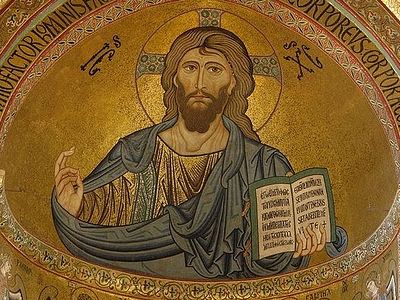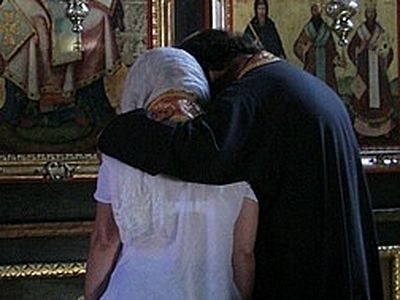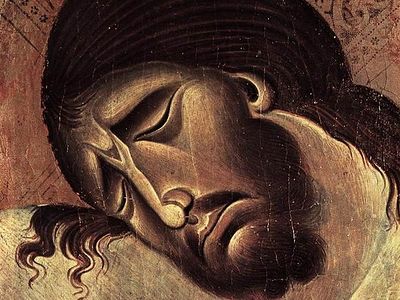
Though I wish I believed otherwise, in the depths of my being, I do not believe any part of us survives death. I am, at the center of my consciousness, a materialist, and a reluctant atheist still. I fight this disposition daily, and it is becoming an enormous burden that I wish I could throw off. There are days where my doubt and despair far eclipse my hope that someday, God will really let me know it’s “not all in my head”, or that He will somehow bless me with a profound Athonite experience to solidify and settle my gnawing pessimism, and to extinguish the flames of absurdity and unbelief that engulf my existence. I am really trying to believe. I desperately want to truly believe. I want it more than anything. I desire an authentic faith. I do not however, want to believe something just so I can sleep at night. This struggle is not unique to myself, I realize that, and I take comfort in knowing many a person, way more intelligent than I, has also struggled profoundly with nihilism, and come out from under the weight of it to become a saint.
This is a quote from a Facebook friend, and I deeply admire the honesty and anguish in his statement. It was occasioned by some questioning that I posted myself. And so I take it upon myself to offer some reflections. I hope they are of help to him and others.
The first observation I want to make is on the assurance with which we experience the materialist option. I never seem to encounter anyone who doubts the materiality of their existence. Some will doubt that there is anything other than a material existence – but they always seem certain of that much. I would add that we seem to think we know what a material existence is, and that its existence is rather obvious and its persistence guaranteed.
In point of fact, although materiality is easily observed, it is not easily explained, nor is its persistence guaranteed. Everything about the universe we inhabit is strikingly precise in the most delicate balance imaginable – far beyond random chance. Any variation in the most primitive forces (those that came about in the first moments of the “big bang”) would have resulted in no universe rather than some other universe. There are compelling reasons to say that we are “meant” to be here.
The continued existence of our world (its persistence) is equally astounding. The world to which we awaken everyday is not a testimony to its inherent stability, but to an inherent providence that sustains us in existence. We should wonder not only that the universe exists, but that it continues to exist.
It is possible (of course) to view the material universe as a sort of given, something that can be taken for granted, but doing so is neither philosophically nor scientifically sound. “It is only wonder that understands anything,” in the words of St. Gregory.
“I do not believe any part of us survives death.”
Though death is a great test and visits destruction on our material form, yet it is no greater test of faith than our present existence in a material form. For our very nature isnothingness, and that nothingness should speak and think and long and pray at any given moment is truly a wonder. And it is no greater wonder or test of faith to believe that existence might be given us beyond the nothingness of death itself.
I will press this a bit further. Much that we take to be our “selves” in our material experience shows itself to be quite ephemeral and illusory when it’s examined more closely. And, on the other hand, there is something that has a dogged persistence regardless of how closely it is scrutinized. Observing this yields something of a glimpse of the “soul,” and directs our attention to its proper place.
What do we mean when we speak of the personality? Do we mean a certain set of memories? A collection of experiences and preferences? Is it our set of skills and techniques? How many of these would we have to lose for the personality and personhood to disappear? As a man in his early 60’s, I have already forgotten more than I can remember. Names escape me. I notice that my memory of things is quite selective, and that some of my stories have become suspect (even to myself). My skills are diminished. My hands struggle to find their place on a keyboard and my fingers move ever more slowly. And though I once gloried in my children, they are now adults. I love them, of course, but the children whom I knew are now disappearing within the mists of my mind. The social relations that so often define us are constantly changing. People who once mattered in my life are now dead, while others live at a distance and probably never give me a thought. Our tastes and proclivities shift constantly. Cigarettes, once a constant presence in my life, have been missing for nearly 30 years.
But there is something that remains and seems to have changed in no way whatsoever. That something is not the object of my consideration, but the subject who considers. The old man who now thinks and writes and groans in the morning, is identical with the child who ran with ease and played his games. That subject is the one who remembers, who experiences, who thinks, who decides. But that subject is not itself the memory, the experience, the thought or the decision. Indeed, it would be possible to imagine that subject with a completely different set of memories, etc., yet still being the same subject!
When we do indeed turn our attention directly to that subject, and away from experiences, memories, etc., we come to a very different place. It is quite possible to simply be aware, to be present with no regard to memory, etc. Indeed, such present awareness is often describe as a “higher” state of consciousness. Prayer, in its most mature forms, has this form of awareness as an almost inherent characteristic.
What is the relationship between this subject, this awareness, and our material existence? Again, its persistence argues for some separation from a purely material account. For, as noted, the subject of a five-year-old is the same subject when it is sixty-years-old, while the material reality will have completely changed many times over. This doesn’t suggest that our material existence is merely a vehicle, but it certainly suggests that the subject that we call the ‘self’ transcends our materiality in some manner.
There is a link. On the whole, the awareness we have as subject is centered in our materiality. We may even think of ourselves, miraculously, as matter that has become aware. When the Church speaks of the soul, we must remember that it does not mean something that is utterly separate from the body:
Spirit and matter are not mutually exclusive. On the contrary, they are interdependent; they interpenetrate and interact. When speaking, therefore, of the human person, we are not to think of the soul and the body as two separable «parts» which together comprise a greater whole. The soul, so far from being a «part» of the person, is an expression and manifestation of the totality of our human personhood, when viewed from a particular point of view. The body is likewise an expression of our total personhood, viewed from another point of view – from a point of view that, although different from the first, is complementary to it and in no respect contrary. «Body» and «soul» are thus two ways of describing the energies of a single and undivided whole. A truly Christian view of human nature needs always to be unitary and holistic. (from a 2002 publication by the Holy Synod of the Church of Greece)
So, when we think of many things that make up our experience, and certainly things that color and shape our experiences, we must consider many known aspects of the body, particularly the brain. Our present science makes us increasingly aware of various conditions that are rooted in the brain and its neurochemistry. Anyone with knowledge of these things who is also a pastor/confessor cannot help but ponder their relationship to the soul. A very helpful image is found in a conversation with the Elder Epiphanios Theodoropoulos:
The image which we can use to describe the relationship of soul and brain is the violin with the violinist. Just as even the best musician cannot make good music if the violin is broken or unstrung, in the same manner a man’s behavior will not be whole (see 2 Tim 3:17) if his brain presents a certain disturbance, in which case the soul cannot be expressed correctly. It is precisely this disturbance of the brain that certain medicines help correct and so aid the soul in expressing itself correctly.
My own take in this is to reflect on the hidden struggle of the soul, often masked by the brain and its disorders. For a person who is biologically prone to depression or any number of problems (for which the Elder strongly recommended medication) there can be a daily, even a moment-by-moment struggle, unseen by the surrounding world – even largely hidden from the individual himself. St. Paul reminds us:
Therefore we do not lose heart. Even though our outward man is perishing, yet the inward man is being renewed day by day. For our light affliction, which is but for a moment, is working for us a far more exceeding and eternal weight of glory, (2Co 4:16-17)
I can only add to this, that, for some, the affliction is far from light and can last a life time. But the weight of glory remains eternal.
The soul (when viewed rightly), represents “an expression of the totality of our human personhood” (as is the body). But the soul frequently remains hidden. Prayer, repentance, silence, stillness and many other spiritual disciplines can help reveal the soul to the subject(the true self) of our life.
So, the end of the matter is a certain attentiveness. We should pay attention to the true nature of the material world in which we live – it is a shimmering moment on the razor’s edge of existence, an enduring testimony to its Creator. At the same time we should pay attention to the true character of our own existence and aspects that clearly reach beyond pure materiality. We are fearfully and wonderfully made, and, if we can be still and listen, we will hear the sound of an eternal weight of glory singing deeply in the heart of all things. It says, “Glory to God for all things.”



